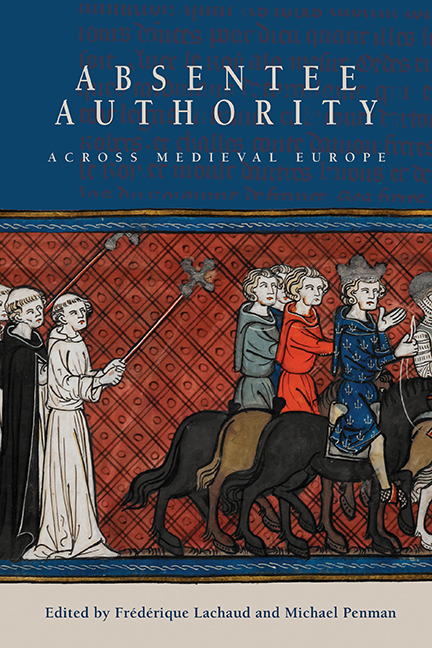Book contents
- Frontmatter
- Contents
- List of Illustrations
- List of Contributors
- Acknowledgements
- List of Abbreviations
- Introduction: Absentee Authority across Medieval Europe
- 1 Incarnating Authority, Exercising Authority: The Figure of the King in the Merovingian Era
- 2 ‘Ubi armae ibi princeps’: Medieval Emblematics as the Real Presence of the Prince
- 3 While the Bishop's Away …: Absentee Bishops of Parma during the Investiture Contest
- 4 An Inconceivable Absence: Usurpers and Illegitimate Rulers in the Genealogical Rolls of the Kings of England, from the Late Thirteenth to the Early Fifteenth Centuries
- 5 Local Loyalty and Absentee Authority in Thirteenth-Century Normandy: The Evidence of the Querimoniae Normannorum (1247)
- 6 Representation and Authority in Thirteenth-Century England and Gascony
- 7 Internal Exiles: Exclusion from the Fourteenth-Century English Court and Kingdom
- 8 ‘Si grant charté a Paris … par defaulté du roy’: Governmental Practice and the Customary Geography of the Absence and Presence of the King in France (1364–1525)
- 9 Was the Couple a Palliative to the Absence of the Prince? The Political Role and Influence of Margaret of Flanders during the Reign of Philip the Bold, Duke and Count of Burgundy (1384–1404)
- 10 Guardian – Lieutenant – Governor: Absentee Monarchy and Proxy Power in Scotland's Long Fourteenth Century
- 11 Absentee Authority in Late Medieval Iceland, as Viewed from the Literary Sources
- 12 Representatives of Kings and ‘Kings’ as Representatives: Authority and its Representation in Professional Groups in Late Medieval and Early Modern France – the Example of the King of Minstrels and of the King of Mercers
- Index
7 - Internal Exiles: Exclusion from the Fourteenth-Century English Court and Kingdom
Published online by Cambridge University Press: 16 May 2018
- Frontmatter
- Contents
- List of Illustrations
- List of Contributors
- Acknowledgements
- List of Abbreviations
- Introduction: Absentee Authority across Medieval Europe
- 1 Incarnating Authority, Exercising Authority: The Figure of the King in the Merovingian Era
- 2 ‘Ubi armae ibi princeps’: Medieval Emblematics as the Real Presence of the Prince
- 3 While the Bishop's Away …: Absentee Bishops of Parma during the Investiture Contest
- 4 An Inconceivable Absence: Usurpers and Illegitimate Rulers in the Genealogical Rolls of the Kings of England, from the Late Thirteenth to the Early Fifteenth Centuries
- 5 Local Loyalty and Absentee Authority in Thirteenth-Century Normandy: The Evidence of the Querimoniae Normannorum (1247)
- 6 Representation and Authority in Thirteenth-Century England and Gascony
- 7 Internal Exiles: Exclusion from the Fourteenth-Century English Court and Kingdom
- 8 ‘Si grant charté a Paris … par defaulté du roy’: Governmental Practice and the Customary Geography of the Absence and Presence of the King in France (1364–1525)
- 9 Was the Couple a Palliative to the Absence of the Prince? The Political Role and Influence of Margaret of Flanders during the Reign of Philip the Bold, Duke and Count of Burgundy (1384–1404)
- 10 Guardian – Lieutenant – Governor: Absentee Monarchy and Proxy Power in Scotland's Long Fourteenth Century
- 11 Absentee Authority in Late Medieval Iceland, as Viewed from the Literary Sources
- 12 Representatives of Kings and ‘Kings’ as Representatives: Authority and its Representation in Professional Groups in Late Medieval and Early Modern France – the Example of the King of Minstrels and of the King of Mercers
- Index
Summary
During the Middle Ages, the English upper classes and those in power over them used geographical movement as a key index by which they could register their respective concerns. We see this most clearly in those who were either forced to leave, or who left by choice, the English king's dominions during the later medieval period. From the earl of Norfolk fleeing England after the 1075 revolt to the duke of Exeter's escape to the Continent in the early 1460s, voluntary or forced foreign exile was a powerful statement either of the intent of the individual or of those in charge. However, there is an equally potent, though far less well examined, form of ‘geographical statement’ connected with the later medieval nobility and gentry: the situation arising when an individual fell out of favour with the king, court and/or those in power, but remained, or had to remain, in the area under the English king's control – either in England itself or in lands the king ruled elsewhere. After all, though a few high-profile nobles – most notably, Henry Bolingbroke, the future Henry IV – successfully returned from foreign exile, most of those returning found their felicity transient at best. Whether Thomas Becket's return to Canterbury in 1170, or Henry VI's reappearance during the Adeption crisis in 1470–1, most such homecomings contained a rather obvious ‘worm in the bud’, which soon broke out. That said, if by the exercise of free will, by necessity or by force, those outside royal, governmental and/ or political favour remained within the king's dominions (if not always England itself), things could be quite different. While in some ways such individuals had publically ‘opted out’, or been forced out, of the right to help govern the kingdom, they were still on the stage, or at least in the wings, and therefore could never be entirely discounted.
The fourteenth century offers a useful case study of the idea of ‘internal exile’ in the later Middle Ages. During this period there were an unusually large number of cases of official and unofficial internal exile, often due to the changing fortunes of the various factions within the royal court (e.g. 1308, 1310, 1312, 1316, 1318, 1322, 1326–7, 1328, 1330, 1340–1, 1376–7, 1388, 1389, 1397, 1399);
- Type
- Chapter
- Information
- Absentee Authority across Medieval Europe , pp. 132 - 152Publisher: Boydell & BrewerPrint publication year: 2017



